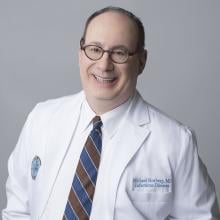As a medical student, do you ever wonder what it’s like to specialize in infectious disease medicine? Meet Michael A. Horberg, MD, MAS, an infectious disease medicine physician and a featured doctor in the AMA’s “Shadow Me” Specialty Series, which offers advice directly from physicians about life in their specialties. Check out his insights to help determine whether a career in infectious diseases might be a good fit for you.
The AMA Specialty Guide simplifies medical students’ specialty selection process, highlights major specialties, details training information, and provides access to related association information. It is produced by FREIDA™, the AMA Residency & Fellowship Database®.
Learn more with the AMA about the medical specialty of infectious disease medicine.
“Shadowing” Dr. Michael A. Horberg
Specialty: Infectious disease medicine.
Practice setting: Multispecialty group practice in an integrated health system.
Employment type: Employed by Mid-Atlantic Permanente Medical Group, which is a member of the AMA Health System Program that provides enterprise solutions to equip leadership, physicians and care teams with resources to help drive the future of medicine.
Years in practice: 36.
A typical day and week in my practice: No week, let alone day, is typical. Over time, I’ve been able to vary my responsibilities, which now include—in addition to clinical time—research, medical education and community health, or patients covered by Medicaid. I see patients two or three days per month. One of the advantages of working for an integrated health system is that it presents opportunities for a variety of roles. My work week is technically 40 hours but I actually work more than 60 hours.
The most challenging and rewarding aspects of infectious diseases: HIV medicine has changed dramatically over time. In the 1990s, the goal for my patients was to extend their lives and guide them towards good death. Now, the challenge with patients who have lived long lives is managing aging and comorbidities. For younger patients, the challenge is to convince them that they will have a normal life expectancy and thrive—if we work together.
The most rewarding aspect is developing long-term relationships with patients and having the tools to control viral loads and bad outcomes. Physicians in HIV medicine have a unique perspective, having seen patients living with this disease go from hiding in the darkest night to living in full daylight. But I remain vigilant.
The impact burnout has on infectious disease medicine: In the 1980s and 1990s, emotional burnout among my HIV colleagues was very common. I sometimes felt drained and despondent. But burnout does not discriminate between specialties. I had the foresight in medical school to know I was not a hospital or night-shift kind of physician. I value sleep, and I’m best in the morning or daytime. So self-knowledge matters.
In the early 2000s, I saw the opportunity to expand my research skills. With the encouragement of my mentors, I went back to school and earned a master’s degree in research from University of California San Francisco. Nothing has been monotonous since.
How Mid-Atlantic Permanente Medical Group is reducing physician burnout: We are making sure we strive for work-life balance. Leaders are tasked with identifying colleagues at early or advanced risk of burnout. We are also trying, in the electronic health record age, to reduce paperwork and secure messages that can be handled by our nursing and pharmacy colleagues. Also, when possible, we’re trying to develop our colleagues’ skills so that there is diversity in their weeks and in their practice.
How my lifestyle matches, or differs from, what I had envisioned: I’ve never struggled to find a healthy work-life balance. The circumstances of my life are pretty straightforward. I don’t have kids, but I do have a husband who is my collaborator in all things. When I’m not working, I’m with him. When I am working, I am doing what I love: caring for patients, conducting research to improve care for people with HIV and other diseases, such as long COVID, and supporting research scientists and aspiring physician researchers.
When I was in medical school, I knew I wanted to help people and improve the practice of medicine. Being part of the Permanente Medical Groups and Kaiser Permanente has provided an incredibly rewarding career and life.
Skills every physician in training should have for infectious diseases but won’t be tested for on the board exam: Empathy and compassion. Those skills prevent burnout and make one a much better physician.
One question physicians in training should ask themselves before pursuing infectious diseases: Can I fully embrace everyone in my community, even if theirs is not a life path I would have taken?
Books, podcasts or other resources every medical student interested in infectious diseases should be reading: I read Annals of Internal Medicine, Clinical Infectious Diseases, JAMA®, and Journal of Acquired Immune Deficiency Syndromes religiously. They give me the latest reviews of medical topics, even if they are not within your day-to-day specialty.
I also really liked—and found useful—Think Like a Freak, by Steven D. Levitt and Stephen J. Dubner, which is about training your brain to think differently and approach problem solving in a new way.
Additional advice I would give to students who are considering infectious diseases: For starters, practicing medicine and expanding your medical knowledge should be fun! Never lose the joy of discovery.
Also, don’t get in a rut. Your practice in five years should not look as it does now. Get involved in your community and professional societies.
Over the years, I’ve chaired an alphabet soup of outside boards, including the Gay and Lesbian Medical Association, the HIV Medicine Association, the Heath Care Systems Research Network, and the Centers for Disease Control and Prevention’s Health Care Action Group. Serving on these boards has been an invaluable complement to my practice. The proudest moment of my career was serving on the Presidential Advisory Council on HIV/AIDS, from 2010–2014.
If you put yourself out there, good things will happen.




